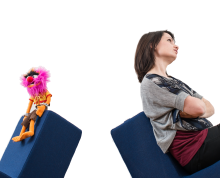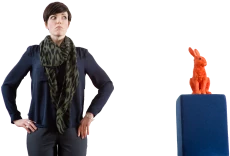How To Influence The Perceived Assertiveness Behaviour
How To Influence The Perceived Assertiveness Behaviour
This article deals with the 'Perceived Assertive Behaviour', exploring ways to influence the way others perceive your message.
This is done through speaking to the unconscious mind and evoking wanted associations.
Assertiveness Models
The literature on assertiveness distinguishes many models, with varying validity and practical usefulness.
In developing the 'Assertiveness Coffee Cards' we have been led to look at the issue from a different angle, namely that of how the brain functions.
Assertive Behaviour
As a result, we propose the following classification of assertive behaviour:
- Reptilian Emotional Assertiveness
- The Learnt Assertiveness Behaviour
- The Frontal Lobes Driven Assertiveness
- The Perceived Assertive Behaviour
Reptilian Emotional Assertiveness
The reptilian emotional assertiveness derives its name from the strong influence of the amygdala that is located in the limbic system, or reptilian brain.
Learnt Assertiveness Behaviour
The learnt assertiveness behaviour is largely linked to the caudate nucleus, where we store our automatic thoughts, prejudices and cognitive reflexes.
Frontal Lobes Driven Assertiveness
The third type of assertiveness is produced by the frontal lobes, the place where humans hold, manipulate and construct their most sophisticated ideas.
Perceived Assertive Behaviour
This article deals specifically with the fourth type of assertive behaviour, namely the perceived assertive behaviour.
This has definitely to do with our own traits, thoughts and actions, but attention is given here to how people interpret them.
Construction of the Mind
Let us remember that, to some extent, 'reality is a construction of the mind'.
This framework explains why the same behaviour may be seen as gentle assertiveness in one culture and an unacceptable lack of politeness in another.
When you communicate, you send a variety of signals that are in effect just sensory perceptions for others.
But these incoming sensory perceptions get their meaning only when they are recognised by their brain.
Each Brain is Unique
Because each brain is unique, it is likely that your messages will receive different interpretations according to the receivers' genetic and neural makeup.
Here, your own words, gesture and intonation get a subjective meaning, reflecting the other person's own experience, beliefs, values and prejudices.
Recognition
There are two types of recognition:
Automatic Recognition
One is the automatic type of recognition that happens when the unconscious brain recognises something that is known to it.
Stimulated Recognition
The other type of recognition happens when the incoming stimulus starts to take on identity along the pathway that runs from the appropriate cortical sensory area to the association area that abuts it.
Information is brought in from memory to flesh out stimulus with the associations that give it meaning.
Cerebral Finger Snap
- A good punchline
- Getting a joke
- Recognising familiar sounds
- Facial expressions
- Understanding metaphors
These all produce what Rita Carter calls a 'cerebral snap of the fingers', delivering a sudden jolt of recognition.
Too Fast for Consciousness
It happens so fast, even before the conscious brain has even decided what the incoming stimuli really are.
Don't we have here a golden opportunity to speak to the unconscious mind of the other?
Moreover, we know that recognition is based on associations. You will also gain from inducing the right associations. If you walk like Charlie Chaplin you would most probably evoke certain feelings.
Imitated Behaviour
If you want to be perceived as gentle but firm in defending your rights, you might want to recourse to a subtle imitation of well known and appreciated leaders.
The good news is that your behaviour even though it is an imitation is likely to ultimately change the way you think and behave.
This article was contributed by M'Hamed CHERIF
Assertiveness Training
Impact Factory runs
Open Assertiveness Training Courses
Tailored Assertiveness Training
and personalised
for anyone who is interested in
Assertiveness Issues


















